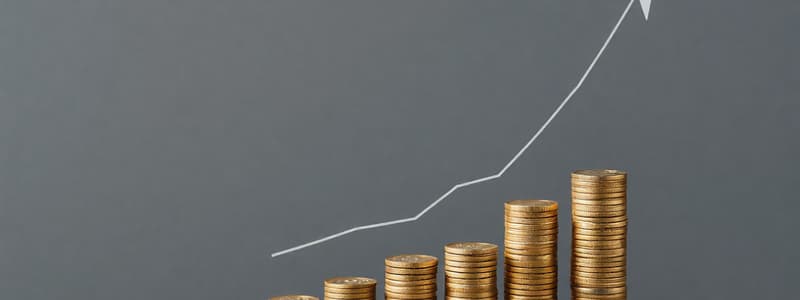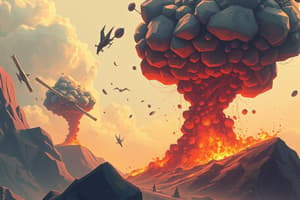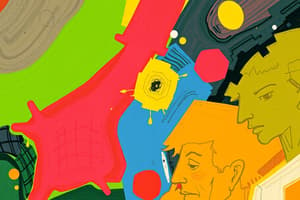Podcast
Questions and Answers
What combination of factors is primarily attributed to stagflation during the 1972 to 1982 period?
What combination of factors is primarily attributed to stagflation during the 1972 to 1982 period?
- Decreased government intervention and falling inflation
- Rising export rates and increased foreign investment
- High inflation and sub-par economic growth (correct)
- Increased consumer spending and high interest rates
Which of the following best defines hyperinflation?
Which of the following best defines hyperinflation?
- An inflation rate exceeding 20% annually
- Extreme economic downturn with rising prices
- Inflation rate greater than 50% per month (correct)
- Moderate inflation accompanied by steady growth
Which country is NOT typically associated with hyperinflation scenarios?
Which country is NOT typically associated with hyperinflation scenarios?
- Zimbabwe
- Germany during the Weimar Republic
- Venezuela
- Japan in the 1990s (correct)
What outcome do some analysts fear might arise post-Covid-19 due to aggressive fiscal and monetary policies?
What outcome do some analysts fear might arise post-Covid-19 due to aggressive fiscal and monetary policies?
Stagflation is typically found in which kind of economies according to historical context?
Stagflation is typically found in which kind of economies according to historical context?
Which aspect is part of Canada’s interaction in international finance?
Which aspect is part of Canada’s interaction in international finance?
What is the equilibrium price of the product?
What is the equilibrium price of the product?
At the equilibrium price of $2,000, how many units are supplied?
At the equilibrium price of $2,000, how many units are supplied?
If the price of the product is set above the equilibrium price, what is expected?
If the price of the product is set above the equilibrium price, what is expected?
Which outcome occurs if the price is set too low?
Which outcome occurs if the price is set too low?
What happens when there is a surplus of the product in the market?
What happens when there is a surplus of the product in the market?
How does an equilibrium price impact market stability?
How does an equilibrium price impact market stability?
What is true when quantity demanded exceeds quantity supplied?
What is true when quantity demanded exceeds quantity supplied?
At what price level would the producer begin to experience unsold inventory?
At what price level would the producer begin to experience unsold inventory?
Which of the following best describes the relationship between political turmoil and currency confidence?
Which of the following best describes the relationship between political turmoil and currency confidence?
Which of the following approaches is NOT used to measure GDP?
Which of the following approaches is NOT used to measure GDP?
What phase follows the contraction phase in the typical business cycle?
What phase follows the contraction phase in the typical business cycle?
Which of the following correctly defines the market value of GDP?
Which of the following correctly defines the market value of GDP?
Which type of economic indicator would allow analysts to assess future economic trends?
Which type of economic indicator would allow analysts to assess future economic trends?
Improvements in long-term economic growth are largely attributed to which of the following?
Improvements in long-term economic growth are largely attributed to which of the following?
What distinguishes true inflation from temporary price changes?
What distinguishes true inflation from temporary price changes?
Which scenario best illustrates deflation?
Which scenario best illustrates deflation?
How does inflation affect the purchasing power of money?
How does inflation affect the purchasing power of money?
If an investor expects a 3% inflation rate, what is the real rate of return on a 7% investment?
If an investor expects a 3% inflation rate, what is the real rate of return on a 7% investment?
Which of the following is NOT a characteristic of money?
Which of the following is NOT a characteristic of money?
Which option best describes the impact of rising inflation on individual budgets?
Which option best describes the impact of rising inflation on individual budgets?
What happens if an individual's income does not keep pace with inflation?
What happens if an individual's income does not keep pace with inflation?
Which statement about inflation and securities markets is true?
Which statement about inflation and securities markets is true?
What can be concluded about price changes in a specific product?
What can be concluded about price changes in a specific product?
How does an increase in scarcity of a product relate to inflation?
How does an increase in scarcity of a product relate to inflation?
Study Notes
Stagflation and Hyperinflation
- Stagflation is characterized by high inflation paired with a slowing rate of economic growth.
- Hyperinflation refers to extreme inflation rates, typically exceeding 50% per month, and usually occurs in underdeveloped economies.
- The period from 1972 to 1982 is widely perceived as a time of stagflation in Western economies due to the dual impact of the Arab oil embargo and subpar economic growth.
- Concerns about potential stagflation have resurfaced, fueled by aggressive fiscal and monetary policies during the Covid-19 crisis.
- The Weimar Republic's hyperinflation in the early 1920s serves as a historical example; Venezuela experienced an inflation rate exceeding 53,000,000% from 2016 to 2019.
Interest Rates and Inflation
- Interest rates significantly influence the economy's performance and can affect inflation levels and purchasing power.
International Finance and Trade
- Canada heavily relies on trade, with goods and services exports making up about one-third of its GDP.
- Market equilibrium is achieved when the price and quantity demanded meet the quantity supplied, exemplified at a price point of $2,000 with a supply of 200 units.
- Inflation is defined as a prolonged rise in prices across the economy, contrasting with deflation, which indicates a general decline in prices.
- Temporary price increases, such as those from oil price surges or new taxes, do not constitute true inflation unless sustained over time.
Impact of Inflation
- Inflation erodes money's purchasing power, necessitating a larger amount of money for the same quantity of goods and services.
- For example, rising costs can increase a person's monthly living expenses from $3,000 to $3,200, impacting their standard of living if income does not keep pace.
- Investment returns must account for inflation; a hypothetical investment of $100,000 with a 7% return in the face of 3% inflation results in a real return of only 4%.
Nature of Money
- Money serves as a medium of exchange accepted for goods and services and can settle debts.
- Political instability can undermine confidence in a currency, leading to a flight to quality as individuals seek more stable currencies.
Economic Principles
- Key decision-makers in the economy include consumers, businesses, and governments.
- Demand and supply dictate market equilibrium, while Gross Domestic Product (GDP) measures the market value of produced goods and services.
- GDP can be calculated through three approaches: expenditure, income, and production.
- The business cycle consists of five phases: recovery, expansion, peak, contraction, and trough, with various economic indicators aiding analysis.
- Improvements in productivity are central to long-term economic growth.
- The Bank of Canada primarily uses monetary policy to maintain economic balance, with the federal government influencing interest and exchange rates.
Fiscal Policy
- Fiscal policy involves government spending and taxation decisions impacting economic performance and job levels.
- The government balances tax revenues and expenditure to facilitate sustained economic growth, with both federal and provincial governments employing fiscal policy measures.
Studying That Suits You
Use AI to generate personalized quizzes and flashcards to suit your learning preferences.
Related Documents
Description
This quiz explores the key concepts of stagflation and hyperinflation, highlighting their characteristics and effects on economies. Understand the differences in inflation rates, economic growth, and the contexts in which these phenomena occur. Ideal for students studying economic theory and macroeconomics.




